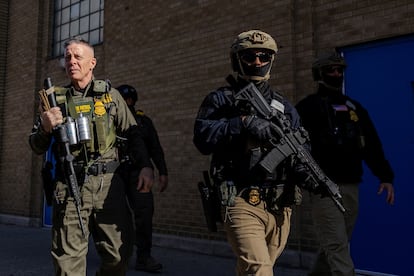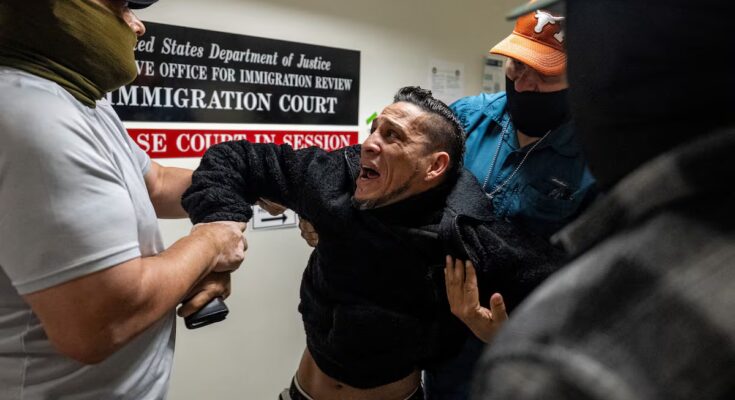There are still six weeks until Zohran Mamdani is sworn in as New York’s next mayor. However, even before his historic victory on November 4, city and state officials are preparing for the possibility that Donald Trump will send more federal agents to strengthen his immigration offensive and deploy the National Guard to the city, as has already been done in other Democratic strongholds. These preparations have intensified since the Socialist was elected, while the Republican administration has doubled down on its threats.
“I intend to be in New York City in the near future. We will be conducting operations,” border czar Tom Homan said Tuesday in Fox News. The senior official added that immigration agents are already in the city and that he intends to send more: “We will flood the area.”
It’s a warning that the Trump administration has been repeating for months, but which becomes particularly relevant now that Mamdani will be mayor of New York. The young democratic socialist rose to lead the City Council of the most populous city in the United States with a strongly anti-Trump and pro-immigration message. After a campaign in which he consistently promised to oppose the president, as mayor-elect, Mamdani remained steadfast in this pledge, openly defying the Republican in his first post-victory speech. “New York will continue to be a city of immigrants,” he said that night.
Although, at the same time, there have been signs that Mamdani is willing to get in touch, or at least try. The mayor-elect’s team announced this week that it had contacted the White House to set up a meeting with Trump. Mamdani said the hypothetical meeting would focus on the city’s economic crisis, a pillar of his campaign. The announcement came after the president also softened his tone and assured on Sunday that he was willing to meet Mamdani. “The mayor of New York wants to meet with us and we will reach an agreement. We want everything to be right for New York,” Trump said, after spending months insulting the socialist, who he called a “crazy communist.”
The approach comes at a time when both the city and the state are preparing for a possible confrontation with the federal government if Trump decides to replicate in New York what has already been done in cities such as Los Angeles, Chicago, Portland (Oregon), Washington DC or Charlotte (North Carolina). In recent months, federal agents have arrived in these cities, all governed by the Democratic Party, carrying out large-scale immigration operations, resulting in hundreds of detainees. Some have also received National Guard troops, while others have managed to stop these deployments in court.
The presence of agents and troops was met with citizen protests that turned violent due to the force with which federal authorities responded, firing tear gas and shooting protesters with rubber bullets, pepper balls and chemical weapons.
So far those scenes have not been filmed in New York. Although there have been raids, such as the one that occurred last October on Canal Street in Lower Manhattan, the activity of immigration agents has been concentrated in a single building: 26 Federal Plaza, a federal skyscraper with several immigration courts also located in Manhattan. Half of the more than 3,000 migrant arrests made in the city in recent months have taken place there.
However, that October 21 raid was a warning for the city. The dramatic military-style operation, with more than 50 officers and armored trucks descending on a tourist area known for its street vendors, most of them migrants, offered a glimpse of what could come in the coming months.
Bad for the economy
Preparations to address this possibility have been led by the office of the state governor, Democrat Kathy Hochul. For weeks, his team held meetings with different sectors of the company to develop a strategy. Those conversations have involved business and real estate leaders, many of whom have ties to or are close to the president. The expectation is that they could intervene to prevent Trump from ordering the federal deployment to the city, implying that such action in New York, the country’s financial capital, would be harmful to the national economy.
“I’ve spoken to many business leaders and told them, ‘When the time comes, be sure to also express your concern about what this would mean for the stability of New York City and the enormous impact it would have across the United States,’” the governor said Monday. “It would have an effect that other cities don’t have, because we are the financial center. And you can’t change that without consequences,” Hochul added.
It is a strategy that has already borne fruit in San Francisco, where Trump intended to send troops last month but decided not to after executives of some of the big tech companies based in the Californian city opposed the strategy.
At the same time, Hochul’s office has remained in contact with officials in cities like Chicago and Los Angeles to gain inspiration for their response. Members of his team asked their colleagues in these cities how they dealt with Trump federalizing the National Guard to take control of a force that is, by law, under the command of each state’s governor. New York is likely to follow the lead of states like Illinois and California, which have responded with lawsuits challenging the deployments.

New York officials also investigated how local police in several cities handled the increase in federal agents on the streets and how they handled citizen protests that arose in response. Like Los Angeles or Chicago, New York is a sanctuary city, so local law enforcement does not cooperate with federal immigration authorities. That’s why the Trump administration has set its sights on these cities, accusing them not only of not cooperating with its agenda of mass detentions and deportations, but also of allowing crime to spread uncontrollably.
Crime was the government’s primary justification for ordering these deployments. However, the data shows that crime is decreasing in all the cities involved. In New York alone, the city saw record lows in shootings and homicides in 2025. Other serious crimes, such as residential burglaries and shoplifting, also declined.
Nonetheless, the Trump administration is convinced that New York will be one of its next targets: “We will increase our law enforcement presence in New York because it is a sanctuary city and we know we have a public safety problem there,” Tom Homan said on Fox News this week. The border czar added that, like Trump, he would be willing to meet with members of the incoming Mamdani administration to “work together on this issue.” “But if they don’t want to cooperate and continue to resist and hinder our efforts, then we will simply send more teams there,” he concluded.
In addition to Albany and City Hall, migrant advocacy groups, community organizations and activists are also preparing to take on whatever the Trump administration has planned for the city. Noting a strategy already employed in Chicago, thousands of whistles are being distributed in areas that have already been subjected to scrutiny by immigration agents or may be subject to their own high foreign populations.
New operations in the south of the country
While New York awaits its turn, the Republican administration has set its sights on the south of the country, on cities that, despite being democratic, do not have “sanctuary” policies because their respective states have legislation that prohibits them. This is the case in Charlotte, North Carolina, where a migrant detention operation has been underway since last Saturday and has already made more than 250 arrests. The government plans to expand the operation beyond the state’s largest city, up to Raleigh, where federal agents have already arrived in recent days.
The next target will be New Orleans (Louisiana). About 250 Border Patrol agents are expected to arrive in Jazz City in the coming weeks for a two-month immigration crackdown that could begin as early as Dec. 1.



